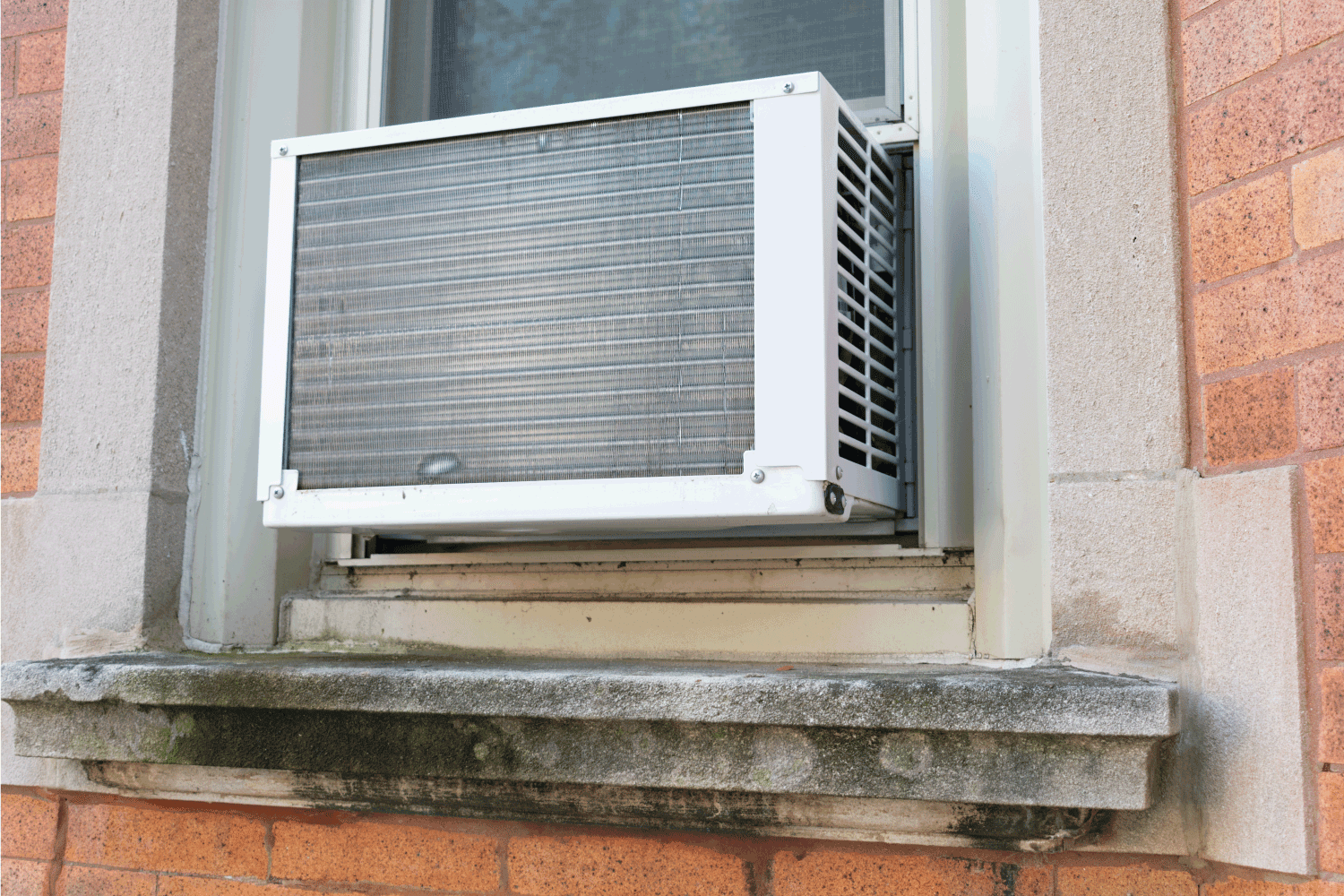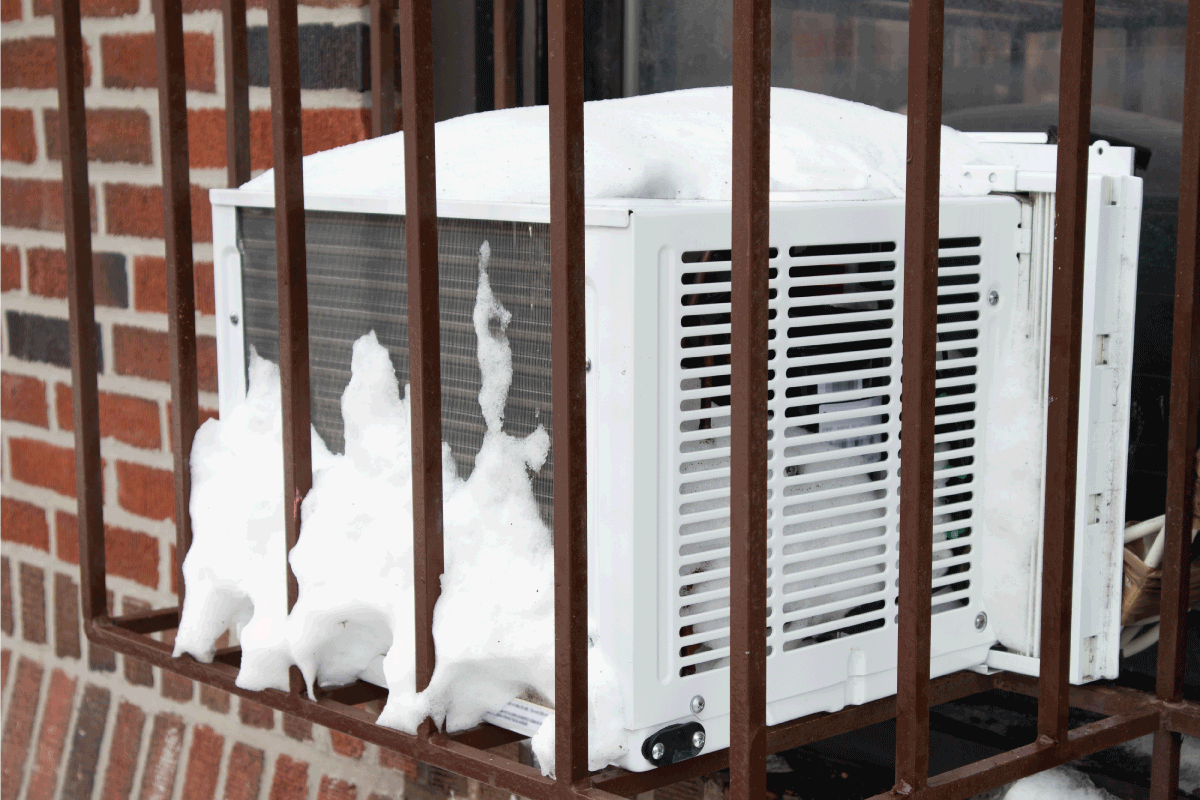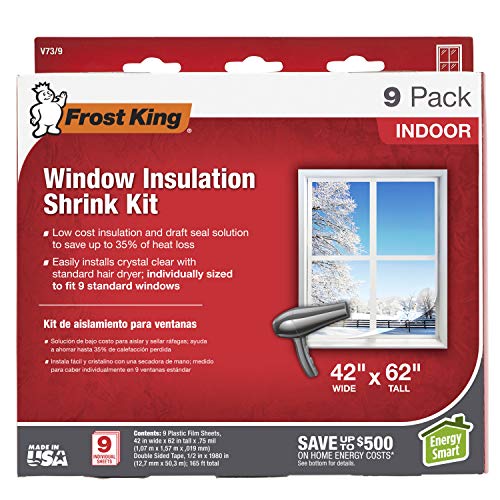Window air conditioners are a convenient way to provide cool air to areas of your home that may not be accessible by your central ventilation system. Maybe this is an add-on bedroom or a detached workshop. Wherever the location, as we approach wintertime, you may be wondering if you need to remove the air conditioner before temperatures dip. We've done the research to tell you.
Yes, you should always remove your window AC before the first freeze of the year. This may even be in autumn before winter has arrived. This is recommended to protect the window unit from damage caused by ice and snow and keep cold air from entering during frigid temperatures.
Now we've given you an answer and told you why this is necessary, but you understandably could have more questions. Maybe you'd like to know how the elements will affect your AC unit if you choose not to remove it, or perhaps you'd like more detailed instructions on what to do with your unit until spring. Keep reading to learn more.

The Window AC
A window air conditioner is an HVAC appliance that has been in use in homes and businesses across America since the 1930s. Even if you haven't had one for personal use before, you've most likely come across them while staying in hotel rooms.
But besides knowing how to turn them on and set a temperature, how much do you know about these machines? It's essential to have a working knowledge of your window AC so that you can better understand how weather and the elements can affect it.

How It Works
Window air conditioners, otherwise referred to as room air conditioners, are composed of a blower, a condenser fan, condenser coils, a compressor, and evaporator coils. These components work together to provide cool air to the adjoining room in six steps.
- When the thermostat on the AC unit senses that the room air has met the set temperature, it cycles on, and the blower begins drawing room air into the unit.
- The compressor then pumps refrigerant through the unit's tubing to the evaporator coils.
- While the refrigerant is circulating through the evaporator coils, the blower brings in warm air. It runs it over the evaporator coils, where the refrigerant absorbs the heat and turns it to vapor.
- This vapor travels to the condenser and then to the condenser coils, where the heat is discharged outside.
- The refrigerant is then converted back to its original form and delivered back to the evaporator coil.
- The process repeats until the set temperature has been met, and the unit will cycle off.
Take a look at this window AC unit on Amazon.
As you can see, the functionality of a window AC unit is dependent on the health of all of its components. If one component is not in shape, the unit may be dysfunctional or be completely unable to provide cool air.
How Does Outside Temperature Affect A Window AC?
You may notice that the prime time for air conditioning units to fail is in the summer, when the temperature is at its highest. This isn't just because people are, of course, using their AC units more in this season. Hot temperatures actually can negatively affect your window air conditioner's components.
Most air conditioners are only designed to cool in 100-degree temperatures or less. When the temperatures exceed this limit, the air conditioner may quickly become overworked. It will consume too much energy and cycle on more than usual and longer than normal.
Check out this digital indoor/outdoor thermometer on Amazon.
In contrast, when experiencing very cold temperatures, your AC unit could freeze up. This is especially true if you are running your air conditioner when the temperature outside is already sitting at 62 degrees Fahrenheit or lower.
Will Rain Damage A Window AC Unit?
This is not likely, as window air conditioners are designed with heavy insulation around their inner components. Water damage is certainly a concern for all homeowners, but this is one area where you need not worry.
However, freezing rain or sleet is an exception. This is more due to the tendency it has to stick to surfaces than its moisture. If the sleet sticks to the AC unit and causes a heavy, thick layer on the machine, this could cause the unit to crack or bend inward.
Will Snow Damage A Window AC Unit?
Snow also has the propensity to damage your machine for the same reason that sleet does. Snow is surprisingly heavy, and if it builds upon the unit, it can cause cracks, bends and then damage the inner parts of the unit, such as the condenser coils and blower.

How Do You Protect Window Air Conditioners In The Winter?
You may be thinking twice about leaving your window unit in place through the winter months now. You may primarily be concerned if your area tends to see a lot of ice and snowfall. If you're looking for some more instructions on how to remove, store and maintain your unit, we've got you covered.
Removing The Unit
Removing the window AC unit is not a complicated job, but it is heavy, so you should always bring along a helper to begin this process.
First, prepare the unit and the area around it. Unplug the unit and, if desired, turn off electricity to the area using the circuit breaker. Then place a towel, sheet, or plastic barrier on the floor in front of the unit to prevent any drips from damaging the floor.
Second, you must remove the sealant around the unit. This may come off easily, or you may need to use a sealant remover agent and a scraper.
Finally, once the sealant has been removed, gently pull the unit from its place in the window with your helper. Lower it to the ground, tilting it backward. This will allow any liquid in the drip tray to drain.
After the unit has been removed, close the window and seal it. There are other methods, but this can easily be done with a window insulation shrink kit.
Take a look at the window insulation shrink kit on Amazon.
Preparing To Store The Unit
Before storing the unit, it is recommended that you clean it thoroughly. This will prevent the build-up of fungus and mold and ensure that the unit will not emit an odor once it is put back in the window in springtime.
You will want to remove the filter, condenser coil, and drip tray. These components should be cleaned separately and thoroughly with vinegar and water and allowed to dry.
The rest of the unit can be accessed by removing the machine's front cover and rinsing it with a hose. Scrub with a brush as needed.
How Do You Protect Window Air Conditioners In The Winter?
Once all components have thoroughly dried and been reassembled, it's time to store the unit. There is a right way and a wrong way to do this.
The right way is to store the air conditioner indoors, in a dry area. You must also place the unit upright. This will keep the components in their proper place and the refrigerant from leaking. It's not necessary to place the unit inside a container, but putting it in its original box may be helpful.
The wrong way is to store your unit outside or in an area prone to leaks or excessive humidity. You should also be sure not to store your air conditioner on its side or back, as this could cause damage over time.
Can You Turn On The AC In The Winter?
It's not recommended to run your air conditioner when the temperature outdoors is less than 62 degrees Fahrenheit. Here's why.
Maintaining proper pressure within an air conditioning unit is important to the machine's health. When the AC is run in low temperatures, the pressure drops, and this can cause the unit to freeze up. This can cause the unit to malfunction or fail.

C0nclusion
A window AC is a helpful machine to have when the central air conditioning does not cool a particular area very well or if the ventilation system has not been included in an add-on or utility space. While it is very effective for warm months, we have concluded that it should not be used in the winter months and should also be removed and stored.
This is due to the damage that cold weather elements can cause an air conditioning unit. To ensure a well functioning unit for when the temperature heats up again, you should always correctly remove and store your window air conditioner over the winter.
Want to learn more about maintaining an air conditioner? Visit these related posts:
4 Best Air Conditioner Covers For Winter
Do Central Air Conditioners Have Filters? [And How To Maintain Them]




I could never imagine that turning on the ac during extreme winters could affect its health. I guess that’s the reason why I had to repair my air conditioner every year during the winters. Thank you for sharing this blog; it has helped me save a lot of bucks. This winter ill make sure to remove my window ac pack it, and store it somewhere safe.